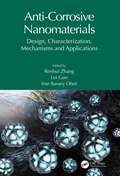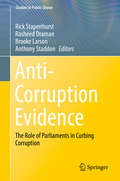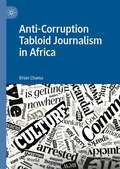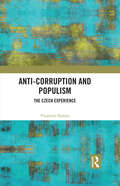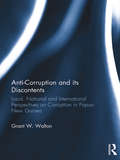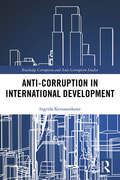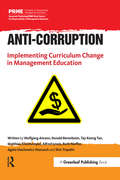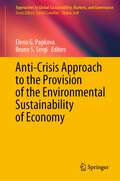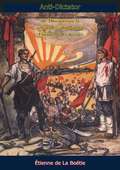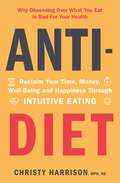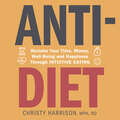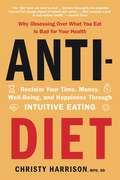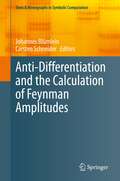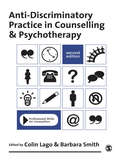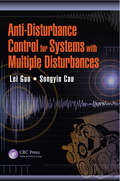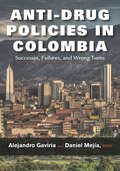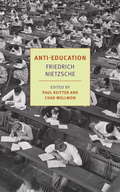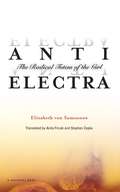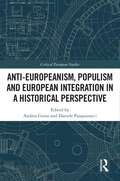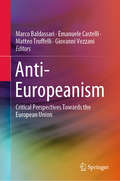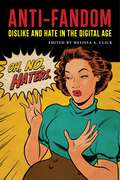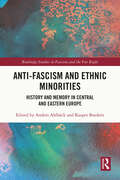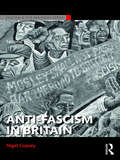- Table View
- List View
Anti-Corrosive Nanomaterials: Design, Characterization, Mechanisms and Applications
by Lei Guo Renhui Zhang Ime Bassey ObotCorrosion is a great challenge in many industries, especially in the automotive, aerospace, and oil and gas industries, with conservative estimations accounting for losses of around 2.2 trillion US dollars per year in the United States alone. Providing a comprehensive overview of the history and development of nanomaterials, this book discusses various practices for protection against corrosion. Key Features: Provides a comprehensive and updated review of major innovations in the field of nanomaterials in industrial, corrosion, and environmental science and engineering Encompasses design, characterization, mechanism, and application of nanomaterials from different strategies on the efficacy and major challenges associated with successful scaleup designing Essential reference for present and future research in nanomaterials Includes relevant aspects of organic and inorganic nanomaterials, hybrid nanomaterials, and nanocoatings in anticorrosion applications Coalescing a wide range of research on nanomaterials and anticorrosion practices, this book is of particular appeal to students, industry professionals, and academics.
Anti-Corruption Evidence: The Role of Parliaments in Curbing Corruption (Studies in Public Choice #34)
by Brooke Larson Rick Stapenhurst Rasheed Draman Anthony StaddonThis book discusses parliamentary oversight and its role in curbing corruption in developing countries. Over the past decade, a growing body of research at the global and regional levels has demonstrated that parliamentary oversight is an important determinant of corruption and that effective oversight of public expenditure is an essential component of national anti-corruption strategies and programs. However, little research has been undertaken at the country level regarding how parliamentary oversight is undertaken, which oversight mechanisms are effective or on how national parliaments interact with other anti-corruption stakeholders. This book presents the results of a new large-scale, quantitative analysis which identifies the mechanisms through which institutional arrangements impact corruption, specifically through country case studies on the Caribbean region, Ghana, Myanmar, Nigeria, Tanzania, and Uganda. Addressing a gap in scholarly knowledge while presenting practical policy advice for parliaments and for anti-corruption assistance agencies, this book will be of use to scholars interested in development, anti-corruption, public finance, as well as members of parliament, anti-corruption practitioners, and organizations working in parliamentary strengthening.
Anti-Corruption Tabloid Journalism in Africa
by Brian ChamaThis book studies the role of tabloid newspapers in exposing corruption and embezzlement in Africa. It makes a timeless, original contribution to the field by examining tabloid journalism practices and anti-corruption forces that have not yet been introduced to Afrocentric journalism scholarship. Defining tabloid journalism practice as an infotainment genre, the book examines corruption exposure by tabloids in Arabic, Portuguese and French speaking countries across Africa, making it a unique addition to the field. In doing so, it also builds an understanding of the evolution of anti-corruption tabloid journalism in Africa and gains insights into the relationship between the anti-corruption actions of the state and the anti-corruption reporting by tabloid journalists focusing on major corruption scandals. Providing evidence of the successes and struggles of journalistic practice in Africa, the book concludes by providing a synthesis of the emerging patterns and divergences from the cases analysed, looking to the future of corruption in the continent and the role of tabloid journalism in uncovering and challenging it.
Anti-Corruption and Populism: The Czech Experience
by Vladimír NaxeraThis book assesses what corruption means for populists, and the anti-corruption rhetoric of populist actors. The author uses the case study of Czech politicians to show how populist politicians exploit the notion of corruption in their communication. Using many examples of different political statements (by presidents, party leaders, MPs, etc.), the populist discourse of corruption is discussed in the context of other discourses presented in Czech politics. The author analyses both Czech (not only populist) political party election manifestos and the political communication on social media from Czech anti-establishment and populist political parties (ANO, Freedom and Direct Democracy, and Pirates). Based on an extensive conceptual framework the book also focuses on whether mainstream parties respond to the success of populists by adopting populist anti-corruption rhetoric themselves and the similarities and differences between the approaches they adopt. Understanding the processes of more than 30 years of Czech post-communist politics, and offering a theoretical and methodological framework applicable to research conducted in other contexts, this book will appeal to scholars of political science, sociology and economics.
Anti-Corruption and its Discontents: Local, National and International Perspectives on Corruption in Papua New Guinea
by Grant W. WaltonThe fight against corruption is now a core part of development policy and practice. Some call these efforts a ‘war on corruption’. What does this so-called ‘war’ mean for developing countries? And how do international perspectives on corruption relate to local and national concerns? This book examines the relevance of anti-corruption discourse in Papua New Guinea (PNG), one of the most culturally rich and ‘corrupt’ countries on earth. Despite increased international, national and local efforts to address corruption over the past two decades, many fear that levels of corruption continue to rise largely unabated. Some believe that the mismatch between international, national and local assumptions regarding the nature of corruption and how it should be addressed is at the heart of the issue. International anti-corruption initiatives stress ‘zero-tolerance’ and try to strengthen formal state-based institutions. However, many people in PNG are more concerned about maintaining social relationships than following state laws and rules. This book critically examines the implications of the anti-corruption agenda and the collision of international, national and local perspectives. In doing so it provides a diagnostic on international assumptions about corruption and how it should be fought in developing countries, offering surprising and important lessons. This book is essential reading for scholars and students of Development Studies, Geography, Political Studies and Economics, as well as practitioners and policy makers working in development.
Anti-Corruption in International Development (Routledge Corruption and Anti-Corruption Studies)
by Ingrida KerusauskaiteCorruption is linked to a wide range of developmental issues, including undermining democratic institutions, slowing economic development and contributing to government instability, poverty and inequality. It is estimated that corruption costs more than 5 per cent of global GDP, and that more than one trillion US dollars are paid in bribes each year. This book unpacks the concept of corruption, its political and ethical influences, its measurement, commitments to combat corruption and ways that this is being attempted. Building on the research on the nature, causes and consequences of corruption, this book analyses international anti-corruption interventions in particular. It discusses approaches to focus efforts to tackle corruption in developing countries on where they are most likely to be successful. The efforts of the UK are considered as a detailed case study, with comparisons brought in as necessary from other countries’ and multilateral institutions’ anti-corruption efforts. Bridging a range of disciplines, Anti-Corruption in International Development will be of interest to students and scholars of international development, public administration, management, international relations, politics and criminal justice.
Anti-Corruption: Implementing Curriculum Change in Management Education (The Principles for Responsible Management Education Series)
by Wolfgang Amann Agata Stachowicz-Stanusch Tay Keong Tan Ronald Berenbeim Matthias Kleinhempel Alfred Lewis Ruth Nieffer Shiv TripathiSuccessful businesses are built on trust. Employees and colleagues need to trust one another and they need to deserve and receive trust from customers and suppliers. Anti-Corruption provides resources for building trust through the implementation of comprehensive guidelines on how to professionalize ethics and anti-corruption education worldwide in a variety of classroom settings. It is written and tested by highly experienced program directors, deans and professors, in how to adopt, adapt and develop best teaching practice. It highlights successful patterns, details illustrative case studies and offers clear, hands-on recommendations. Anti-Corruption enables business schools, management-related academic institutions, and Executive Training Programs to embed curriculum change quickly to achieve positive outcomes. It enables degree programs and executive education programs to achieve global standards that will be widely followed.
Anti-Crisis
by Janet RoitmanCrisis is everywhere: in Iraq, Afghanistan, Syria, and the Congo; in housing markets, money markets, financial systems, state budgets, and sovereign currencies. In Anti-Crisis, Janet Roitman steps back from the cycle of crisis production to ask not just why we declare so many crises but also what sort of analytical work the concept of crisis enables. What, she asks, are the stakes of crisis? Taking responses to the so-called subprime mortgage crisis of 2007-2008 as her case in point, Roitman engages with the work of thinkers ranging from Reinhart Koselleck to Michael Lewis, and from Thomas Hobbes to Robert Shiller. In the process, she questions the bases for claims to crisis and shows how crisis functions as a narrative device, or how the invocation of crisis in contemporary accounts of the financial meltdown enables particular narratives, raising certain questions while foreclosing others.
Anti-Crisis Approach to the Provision of the Environmental Sustainability of Economy (Approaches to Global Sustainability, Markets, and Governance)
by Elena G. Popkova Bruno S. SergiThis book focuses on the notion of the environmental sustainability of the economy. The Sustainable Development Goals, formulated by the UN, led to the formation of a concept of the environmental sustainability of the economy. This concept implies the harmony of economy and environment, achieved due to the support for the SDGs in the economy. This book is original due to its reconsidering the environmental sustainability of the economy from the position of crises. The theoretical significance of the book consists in the development of an anti-crisis approach to the provision of the environmental sustainability of the economy: responsible nature use based on digital markets and smart governance. The proprietary approach allows for the comprehensive description of the potential of the leading technologies—artificial intelligence (AI), robots, the Internet of Things (IoT), and blockchain—to support—during their use in smart governance—crisis management of the environmental sustainability of economy.The book’s practical significance is due to the description and detailed discussion of the modern international experience of responsible nature use given the specifics of developed and developing countries. The anti-crisis approach to the provision of the environmental sustainability of the economy is based on digital markets: FinTech, EdTech, GovTech, AgroTech, and EnergyTech, the practice of which is described in the book with the help of multiple examples from the international experience and case studies. The book is aimed at scholars who study environmental economics. In this book, they find an innovative view of the environmental sustainability of the economy in its close connection with economic crises.
Anti-Dictator: the Discours sur la servitude volontaire of Étienne de La Boétie
by Étienne de La BoétieThis famous essay asserts that tyrants have power because the people give it to them. La Boetie linked together obedience and domination, a relationship which would be later elaborated by anarchist thinkers. By advocating a solution of simply refusing to support the tyrant, he became one of the earliest advocates of civil disobedience and nonviolent resistance. “To him, the great mystery of politics was obedience to rulers. Why in the world do people agree to be looted and otherwise oppressed by government overlords? It is not just fear, Boetie explains in “The Discourse on Voluntary Servitude,” for our consent is required. And that consent can be non-violently withdrawn.”—Lew Rockwell
Anti-Diet: Reclaim Your Time, Money, Well-Being and Happiness Through Intuitive Eating
by Christy HarrisonA how-to guide to reclaiming your time, money, health and happiness in our toxic diet culture.In Anti-Diet, Christy Harrison takes on diet culture and the multi-billion-pound industries that profit from it, exposing all the ways it robs people of their time, money, health and happiness. It will turn what you think you know about health and wellness upside down, as Harrison explores the history of diet culture, how it's infiltrated the health and wellness world, how to recognise it in all its sneaky forms, and how letting go of efforts to lose weight or eat 'perfectly' actually helps to improve people's health - no matter their size. Drawing on scientific research, personal experience and stories from patients and colleagues, Anti-Diet provides a radical alternative to diet culture, and helps readers reclaim their bodies, minds, and lives so they can focus on the things that truly matter.'Please read this book! Anti-Diet is the book to end all diet books, and will be a game changer for so many people. Christy is an expert on this subject and leaves no stone unturned in exposing how insidious and harmful diet culture is - and teaching readers how to opt-out of the madness.' - Caroline Dooner, author of The F*ck It Diet 'A huge burden has been lifted: I no longer have to revise my first book to reflect current understanding! Christy Harrison beat me to it. I'm blown away by how good Anti-Diet is. Using a social justice lens, well-researched and smart science, captivating storytelling, and practical advice, this book will help you reclaim your life from the throttle of diet culture.'- Linda Bacon, author of Health at Every Size, co-author of Body Respect'Most diet and wellness books claim to address mind, body, and spirit, but in fact they are just about body. Thank goodness for Christy Harrison, whose empathetic book reveals oppressive diet culture for what it truly is, and offers a genuinely holistic alternative.' - Alan Levinovitz, author of The Gluten Lie
Anti-Diet: Reclaim Your Time, Money, Well-Being and Happiness Through Intuitive Eating
by Christy HarrisonA how-to guide to reclaiming your time, money, health and happiness in our toxic diet culture.In Anti-Diet, Christy Harrison takes on diet culture and the multi-billion-pound industries that profit from it, exposing all the ways it robs people of their time, money, health and happiness. It will turn what you think you know about health and wellness upside down, as Harrison explores the history of diet culture, how it's infiltrated the health and wellness world, how to recognise it in all its sneaky forms, and how letting go of efforts to lose weight or eat 'perfectly' actually helps to improve people's health - no matter their size. Drawing on scientific research, personal experience and stories from patients and colleagues, Anti-Diet provides a radical alternative to diet culture, and helps readers reclaim their bodies, minds, and lives so they can focus on the things that truly matter.(P) 2019 Hachette Audio
Anti-Diet: Reclaim Your Time, Money, Well-Being, and Happiness Through Intuitive Eating
by Christy HarrisonReclaim your time, money, health, and happiness from our toxic diet culture with groundbreaking strategies from a registered dietitian, journalist, and host of the "Food Psych" podcast.68 percent of Americans have dieted at some point in their lives. But upwards of 90% of people who intentionally lose weight gain it back within five years. And as many as 66% of people who embark on weight-loss efforts end up gaining more weight than they lost. If dieting is so clearly ineffective, why are we so obsessed with it?The culprit is diet culture, a system of beliefs that equates thinness to health and moral virtue, promotes weight loss as a means of attaining higher status, and demonizes certain ways of eating while elevating others. It's sexist, racist, and classist, yet this way of thinking about food and bodies is so embedded in the fabric of our society that it can be hard to recognize. It masquerades as health, wellness, and fitness, and for some, it is all-consuming. In Anti-Diet, Christy Harrison takes on diet culture and the multi-billion-dollar industries that profit from it, exposing all the ways it robs people of their time, money, health, and happiness. It will turn what you think you know about health and wellness upside down, as Harrison explores the history of diet culture, how it's infiltrated the health and wellness world, how to recognize it in all its sneaky forms, and how letting go of efforts to lose weight or eat "perfectly" actually helps to improve people's health -- no matter their size. Drawing on scientific research, personal experience, and stories from patients and colleagues, Anti-Diet provides a radical alternative to diet culture, and helps readers reclaim their bodies, minds, and lives so they can focus on the things that truly matter.
Anti-Differentiation and the Calculation of Feynman Amplitudes (Texts & Monographs in Symbolic Computation)
by Carsten Schneider Johannes BlümleinThis volume comprises review papers presented at the Conference on Antidifferentiation and the Calculation of Feynman Amplitudes, held in Zeuthen, Germany, in October 2020, and a few additional invited reviews. The book aims at comprehensive surveys and new innovative results of the analytic integration methods of Feynman integrals in quantum field theory. These methods are closely related to the field of special functions and their function spaces, the theory of differential equations and summation theory. Almost all of these algorithms have a strong basis in computer algebra. The solution of the corresponding problems are connected to the analytic management of large data in the range of Giga- to Terabytes. The methods are widely applicable to quite a series of other branches of mathematics and theoretical physics.
Anti-Discriminatory Practice in Counselling & Psychotherapy (Professional Skills for Counsellors Series)
by Barbara Smith Mr Colin LagoAnti-Discriminatory Practice in Counselling and Psychotherapy is a groundbreaking text which identifies the ease with which individuals can be disadvantaged merely on the basis of their gender, race, culture, age, sexuality or ability. Examining these and other areas of discrimination, leading experts highlight how vital it is for counsellors, psychotherapists - and others in the helping professions - to be aware of and engage with their own social, political and cultural attitudes, and how they must develop their skills as culturally sensitive, reflective practitioners if counselling is to be truly accessible to all members of society. This substantially revised and updated second edition now also includes chapters on working within an anti-discriminatory approach with: - refugees - people with mental health difficulties - people with disfigurement or visible differences. While each thought-provoking chapter now: - links theory to practice by providing case studies and extracts from therapeutic dialogues - assesses the most recent research findings - provides exercises for enhancing awareness and skills within each different domain or care setting - presents references for further recommended reading. Clearly written and accessible, Anti-discriminatory Practice in Counselling and Psychotherapy is an indispensable addition to the toolkit of everyone either training to be or practising in the counselling and psychotherapeutic professions.
Anti-Disturbance Control for Systems with Multiple Disturbances (Automation and Control Engineering)
by Lei Guo Songyin CaoThe main focus of this monograph will be on the Enhanced Anti-Disturbance Control and filtering theory and their applications. In fact, the classical anti-disturbance control theory only considered one "equivalent" disturbance which is merged by different unknown sources. However, it is noted that along with the development of information obtaining and processing technologies, one can get more information or knowledge about various types of disturbances.
Anti-Drug Policies in Colombia: Successes, Failures, and Wrong Turns (Vanderbilt Center for Latin American Studies Series)
by Alejandro Gaviria Daniel Mejia Jimmy WeiskopfForty years after the declaration of the "war on drugs" by President Nixon, the debate on the effectiveness and costs of the ban is red-hot. Several former Latin American presidents and leading intellectuals from around the world have drawn attention to the ineffectiveness and adverse consequences of prohibitionism. This book thoroughly analyzes the drug policies of one of the main protagonists in this war.The book covers many topics: the economics of drug production, the policies to reduce consumption and decrease supply during the Plan Colombia, the effects of the drug problem on Colombia's international relations, the prevention of money laundering, the connection between drug trafficking and paramilitary politics, and strategies against organized crime. Beyond the diversity in topics, there is a common thread running through all the chapters: the need to analyze objectively what works and what does not, based on empirical evidence. Presented here for the first time to an English-speaking audience, this book is a contribution to a debate that urgently needs to transcend ideology and preconceived opinions.
Anti-Drug Policies in Colombia: Successes, Failures, and Wrong Turns (Vanderbilt Center for Latin American Studies Series)
by Alejandro Gaviria, Daniel Mejía; translated by Jimmy WeiskopfForty years after the declaration of the "war on drugs" by President Nixon, the debate on the effectiveness and costs of the ban is red-hot. Several former Latin American presidents and leading intellectuals from around the world have drawn attention to the ineffectiveness and adverse consequences of prohibitionism. This book thoroughly analyzes the drug policies of one of the main protagonists in this war. The book covers many topics: the economics of drug production, the policies to reduce consumption and decrease supply during the Plan Colombia, the effects of the drug problem on Colombia's international relations, the prevention of money laundering, the connection between drug trafficking and paramilitary politics, and strategies against organized crime. Beyond the diversity in topics, there is a common thread running through all the chapters: the need to analyze objectively what works and what does not, based on empirical evidence. Presented here for the first time to an English-speaking audience, this book is a contribution to a debate that urgently needs to transcend ideology and preconceived opinions.
Anti-Education
by Friedrich Nietzsche Damion Searls Paul Reitter Chad WellmonAN NYRB Classics OriginalIn 1869, at the age of twenty-four, the precociously brilliant Friedrich Nietzsche was appointed to a professorship of classical philology at the University of Basel. He seemed marked for a successful and conventional academic career. Then the philosophy of Schopenhauer and the music of Wagner transformed his ambitions. The genius of such thinkers and makers--the kind of genius that had emerged in ancient Greece--this alone was the touchstone for true understanding. But how was education to serve genius, especially in a modern society marked more and more by an unholy alliance between academic specialization, mass-market journalism, and the militarized state? Something more than sturdy scholarship was called for. A new way of teaching and questioning, a new philosophy . . . What that new way might be was the question Nietzsche broached in five vivid, popular public lectures in Basel in 1872. Anti-Education presents a provocative and timely reckoning with what remains one of the central challenges of the modern world.
Anti-Electra: The Radical Totem of the Girl (Univocal)
by Elisabeth von SamsonowA close examination of the relationship between media, art, and the &“Electra complex&” The feminist counterpart to Deleuze and Guattari&’s Anti-Oedipus, Anti-Electra is a philosophy of &“the girl&” as a model of contemporary transgressive subjectivity. Elisabeth von Samsonow asserts that focusing on the girl&’s escape from the Oedipus complex leads to a fundamental shift in our most common views on media and art.Presenting an interpretation of contemporary technics, Anti-Electra argues that technology today encompasses Electra&’s gadgets and toys. According to von Samsonow, satellite drive technologies such as wireless telephones, WLAN, and GPS echo the &“preoedipal constellation&” that the girl specializes in. And with the help of the girl, the cartography of overlapping zones between humankind and animals, as well as between humankind and apparatuses, is redesigned through what the book holds as a &“radical totemism.&” Anti-Electra ultimately offers a new view on gender, the contemporary world dyed by symbolic girlism, and the (universal) girl in critical dialogue with media, ecology, and society.
Anti-Europeanism, Populism and European Integration in a Historical Perspective (Critical European Studies)
by Andrea Guiso Daniele PasquinucciThis book explores the long-term origins of populist Euroscepticism.Taking a historical perspective to move beyond explaining present-day expressions of opposition to the European Union in isolation, this book reveals the historical sedimentation of the several ways and forms taken over decades by opposition towards European integration. As such, this approach – with contributions from across disciplines - explains not just the past of Euroscepticism, but also its current nature and future prospects.This book will be of key interest to scholars and students of European History, European Politics and Studies and more broadly to Political Science, International Relations, the Humanities and Social Sciences.
Anti-Europeanism: Critical Perspectives Towards the European Union
by Marco Baldassari Emanuele Castelli Matteo Truffelli Giovanni VezzaniThe book analyzes different critical attitudes towards European integration from a multidisciplinary perspective. By applying both quantitative and normative-theoretical approaches, the contributors assess the causes and effects of the popularity of EU-critical positions and doctrines, such as souverainism, neo-nationalism and neo-populism. The book also presents country studies to compare populist movements and parties, such as the Five Stars Movement in Italy, Syriza in Greece and UKIP in the UK. It offers insights into the historical and normative roots of the diverse anti-European standpoints, and the various political demands and agendas connected with these views, ranging from rejections of EU institutions to demands for institutional reforms and propositions for alternative projects.
Anti-Fandom: Dislike and Hate in the Digital Age (Postmillennial Pop #24)
by Bethan Jones Anne Gilbert Jonathan Gray Matt Hills Roberta Pearson Whitney Phillips Cornel Sandvoss Rebecca Williams Emma A. Jane Louisa Stein Bertha Chin Alfred L. Martin Jr. Holly Wilson Holladay Michelle M Rivera Richard McCullochA revealing look at the pleasure we get from hating figures like politicians, celebrities, and TV characters, showcased in approaches that explore snark, hate-watching, and trolling The work of a fan takes many forms: following a favorite celebrity on Instagram, writing steamy fan fiction fantasies, attending meet-and-greets, and creating fan art as homages to adored characters. While fandom that manifests as feelings of like and love are commonly understood, examined less frequently are the equally intense, but opposite feelings of dislike and hatred. Disinterest. Disgust. Hate. This is anti-fandom. It is visible in many of the same spaces where you see fandom: in the long lines at ComicCon, in our politics, and in numerous online forums like Twitter, Tumblr, Reddit, and the ever dreaded comments section. This is where fans and fandoms debate and discipline. This is where we love to hate. Anti-Fandom,a collection of 15 original and innovative essays, provides a framework for future study through theoretical and methodological exemplars that examine anti-fandom in the contemporary digital environment through gender, generation, sexuality, race, taste, authenticity, nationality, celebrity, and more. From hatewatching Girls and Here Comes Honey Boo Boo to trolling celebrities and their characters on Twitter, these chapters ground the emerging area of anti-fan studies with a productive foundation. The book demonstrates the importance of constructing a complex knowledge of emotion and media in fan studies. Its focus on the pleasures, performances, and practices that constitute anti-fandom will generate new perspectives for understanding the impact of hate on our identities, relationships, and communities.
Anti-Fascism and Ethnic Minorities: History and Memory in Central and Eastern Europe (Routledge Studies in Fascism and the Far Right)
by Kasper Braskén Anders AhlbäckAnti-Fascism and Ethnic Minorities explores how, and to what extent, fascist ultranationalism elicited an anti-fascist response among ethnic minority communities in Eastern and Central Europe. The edited volume analyses how identities related to class, ethnicity, gender and political ideologies were negotiated within and between minorities through confrontations with domestic and international fascism. By developing and expanding the study of Jewish anti-fascism and resistance to other minority responses, the book opens the field of anti-fascism studies for a broader comparative approach. The volume is thematically located in Central and Eastern Europe, cutting right across the continent from Finland in the North to Albania in the Southeast. The case studies in the fourteen research chapters are divided into five thematic sections, dealing with the issues of 1) minorities in borderlands and cross-border antifascism, 2) minorities navigating the ideological squeeze between communism and fascism, 3) the role of intellectuals in the defence of minority rights, 4) the anti-fascist resistance against fascist and Nazi occupation during World War II, as well as 5) the conflictual role ascribed to ethnicity in post-war memory politics and commemorations. The editors describe their intersectional approach to the analysis of ethnicity as a crucial category of analysis with regard to anti-fascist histories and memories. The book offers scholars and students valuable historical and comparative perspectives on minority studies, Jewish studies, borderland studies, and memory studies. It will appeal to those with an interest in the history of race and racism, fascism and anti-fascism, and Central and Eastern Europe.
Anti-Fascism in Britain: Britain In The Inter-war Period (Routledge Studies in Fascism and the Far Right)
by Nigel CopseyAnti-fascism has long been one of the most active and dynamic areas of radical protest and direct action. Yet it is an area of struggle and popular resistance that remains largely unexplored by historians, sociologists and political scientists. Fully revised and updated from its earlier edition, this book continues to provide the definitive account of anti-fascism in Britain from its roots in the 1930s opposition to Oswald Mosley and the British Union of Fascists, to the street demonstrations and online campaigns of the twenty-first century. The author draws on an impressive range of sources including official government, police and security services records, the writings and recollections of activists themselves, and the publications and propaganda of anti-fascist groups and their opponents. The book traces the ideological, tactical and organisational evolution of anti-fascist groups and explores their often complicated relationships with the mainstream and radical left, as well as assessing their effectiveness in combating the extreme right.
